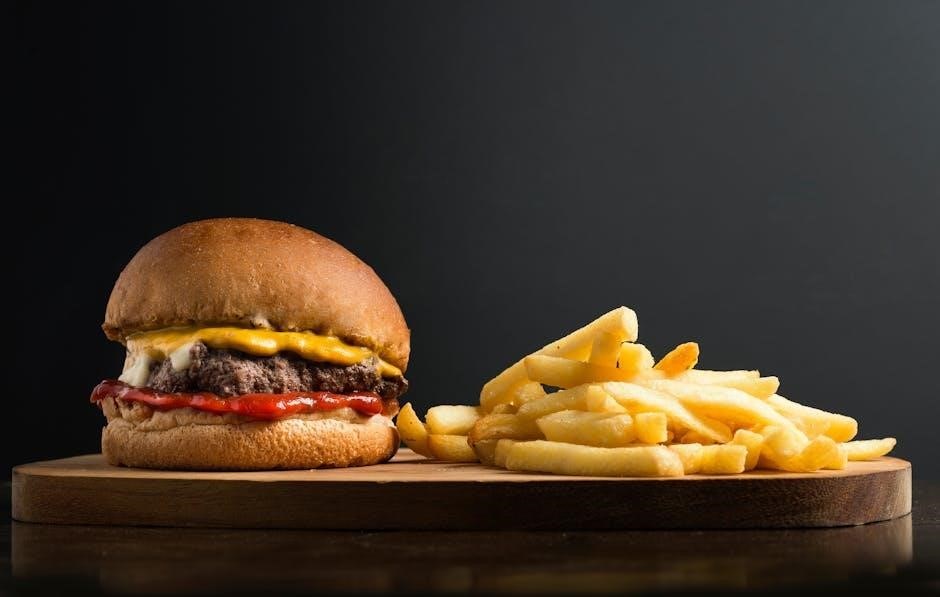
A 3500-calorie meal plan is a hyper-caloric diet designed to promote weight gain and muscle growth, ideal for athletes or those with high energy needs․ It provides a structured approach to consuming nutrient-rich foods, balancing proteins, carbs, and fats to support energy and muscle repair․ This plan can be customized to fit individual preferences and goals, ensuring a healthy and sustainable way to increase calorie intake․
What is a 3500 Calorie Meal Plan?
A 3500-calorie meal plan is a hyper-caloric diet designed to support weight gain and muscle growth․ It provides a structured approach to consuming nutrient-rich foods, balancing proteins, carbs, and fats․ This plan is ideal for athletes or individuals with high energy needs, offering a detailed breakdown of daily meals to ensure sustained energy and muscle repair․ It can be customized to fit individual preferences and goals, making it a flexible and effective tool for healthy weight gain․
Why Choose a 3500 Calorie Meal Plan?
A 3500-calorie meal plan is ideal for individuals seeking to gain weight or build muscle․ It provides a balanced intake of proteins, carbs, and fats, ensuring sustained energy and muscle repair․ This plan is customizable to fit personal preferences and dietary needs, making it a sustainable option for healthy weight gain․ By following a structured approach, it helps achieve calorie goals without compromising nutritional quality, supporting overall health and performance․
Who Benefits from a 3500 Calorie Meal Plan?
A 3500-calorie meal plan is ideal for athletes, bodybuilders, and individuals with high energy needs․ It also benefits those looking to gain weight or muscle mass․ People with fast metabolisms or who are underweight can use this plan to ensure they meet their calorie goals․ Additionally, it supports individuals recovering from illness or those needing to bulk up for sports or personal goals, providing a structured approach to healthy weight gain․
Benefits of a 3500 Calorie Meal Plan
A 3500-calorie meal plan supports muscle growth, weight gain, and increased energy levels․ It is tailored for athletes, bodybuilders, and individuals with high energy needs, ensuring a balanced intake of nutrients for optimal performance and recovery․
Muscle Building and Growth
A 3500-calorie meal plan is ideal for muscle building, as it provides sufficient protein, carbs, and fats to support muscle repair and growth․ High protein intake aids in muscle synthesis, while carbohydrates fuel workouts․ Fats support hormone production, essential for muscle development․ This plan ensures a balanced intake of nutrients, tailored for athletes and bodybuilders aiming to increase lean muscle mass effectively․ It promotes recovery and growth, making it a popular choice for those seeking to enhance physical performance and strength․
Weight Gain and Increased Mass
A 3500-calorie meal plan is specifically designed to support weight gain and increased mass by providing a surplus of nutrients․ It ensures a balance of proteins, carbohydrates, and fats to exceed daily caloric needs, promoting healthy weight gain․ This plan is ideal for individuals with high energy demands or those seeking to add mass through strategic eating, focusing on nutrient-dense meals rather than unhealthy overconsumption of calories․
Improved Energy Levels
A 3500-calorie meal plan helps maintain consistent energy levels by balancing macronutrients․ Carbohydrates provide immediate energy, proteins support muscle repair, and fats sustain endurance․ This structured approach ensures steady energy throughout the day, avoiding crashes․ Proper hydration and sleep further enhance energy levels, making this plan ideal for active individuals with high energy demands, such as athletes or those with physically demanding lifestyles․

Structure of the 3500 Calorie Meal Plan
The 3500-calorie meal plan is divided into multiple meals throughout the day, ensuring a balance of proteins, carbs, and fats․ It includes breakfast, lunch, dinner, and snacks, providing a structured approach to meet daily caloric needs while maintaining nutrient balance and variety․

Daily Meal Distribution
A 3500-calorie meal plan is typically divided into 5-6 meals per day, including breakfast, lunch, dinner, and 2-3 snacks․ This distribution ensures consistent energy levels and supports muscle growth․ Breakfast often accounts for 30% of daily calories, lunch 35%, dinner 25%, and snacks 10%․ Each meal is balanced with proteins, carbs, and fats, such as oatmeal with eggs for breakfast, grilled chicken with rice for lunch, and salmon with sweet potatoes for dinner․ Snacks like nuts, fruits, or protein shakes are added to meet the caloric goal․
Breakfast Options
Breakfast in a 3500-calorie meal plan should be high in calories and nutrients․ Options include oatmeal with eggs, whole-grain pancakes, or a bagel with peanut butter․ A sample breakfast might be 2 cups of oatmeal (300 calories), 4 eggs (200 calories), and a banana (100 calories)․ This provides a balanced mix of carbs, protein, and fats to kickstart metabolism and energy levels for the day, supporting muscle growth and overall health․
Lunch and Dinner Ideas
Lunch and dinner in a 3500-calorie meal plan should focus on calorie-dense, nutrient-rich options․ Ideas include grilled chicken with brown rice and steamed vegetables (700 calories), pasta with lean ground beef and marinara sauce (750 calories), or baked salmon with quinoa and asparagus (650 calories)․ These meals provide balanced macronutrients, supporting muscle growth and energy needs while keeping flavors varied and satisfying throughout the day․
Snacks and Supplements
Snacks and supplements play a crucial role in a 3500-calorie meal plan, helping to meet daily calorie goals․ High-calorie snacks like trail mix, granola, or protein bars are ideal․ Supplements such as whey protein, mass gainers, and multivitamins can enhance muscle growth and fill nutritional gaps․ Timing supplements, like post-workout protein intake, ensures optimal recovery and muscle repair, supporting overall progress in weight and muscle gain effectively․

Macronutrient Breakdown
A 3500-calorie meal plan balances proteins, carbohydrates, and fats to support muscle growth and energy needs․ Proteins aid muscle repair, carbs provide energy, and fats support hormone production․
Proteins: The Building Blocks
Proteins are essential for muscle repair and growth, making them a cornerstone of the 3500-calorie meal plan․ High-quality sources like egg whites, lean meats, fish, and whey protein are emphasized․ Aim for 170-200 grams daily to support muscle synthesis and recovery․ Including protein-rich foods in every meal ensures sustained muscle growth and satisfies hunger, making it easier to meet caloric goals without excessive fat or sugar intake․
Carbohydrates: Energy Sources
Carbohydrates are the primary energy source in a 3500-calorie meal plan, fueling workouts and daily activities․ Complex carbs like oatmeal, whole grains, and fruits provide sustained energy and support muscle recovery․ Aim for 400-500 grams daily, balancing intake across meals to maintain energy levels and promote muscle growth․ Pairing carbs with proteins enhances nutrient absorption, ensuring optimal performance and recovery for those aiming to gain weight and build muscle effectively․
Fats: Essential for Hormones
Fats are crucial for hormone production and overall health in a 3500-calorie meal plan․ They aid in the absorption of fat-soluble vitamins and provide sustained energy․ Healthy sources like avocados, nuts, and olive oil are rich in essential fatty acids․ Balancing fats ensures proper hormone function, supporting muscle growth and recovery․ Aim for 65-80 grams daily, focusing on unsaturated fats to maintain a healthy and balanced diet for weight gain and muscle development․

Sample 7-Day Meal Plan
A 3500-calorie meal plan includes 7 days of balanced meals, with options like oatmeal, egg whites, ground beef, pasta, and tuna․ Each day offers variety and nutrient-rich foods to support weight gain and muscle growth, ensuring a mix of proteins, carbs, and fats․ Customize the plan with your preferences and adjust portion sizes as needed for optimal results․
Start your 3500-calorie meal plan with nutrient-dense foods․ Breakfast includes oatmeal with honey and egg whites․ Lunch features ground beef, pasta, and vegetables․ Dinner consists of tuna, rice, and steamed broccoli․ Snacks like yogurt, granola, and trail mix keep energy levels high․ This balanced approach ensures adequate protein, carbs, and fats to support muscle growth and energy․ Adjust portion sizes based on your needs and stay hydrated throughout the day․
Day 2: Balancing Nutrients
Day 2 focuses on balancing macronutrients for optimal energy and growth․ Breakfast includes scrambled eggs, whole-grain toast, and avocado․ Lunch features grilled chicken, quinoa, and mixed vegetables․ Dinner consists of salmon, sweet potatoes, and green beans․ Snacks like nuts and fruit smoothies provide additional calories․ This balanced approach ensures sufficient protein, healthy fats, and complex carbs, supporting muscle repair and energy levels throughout the day while maintaining nutritional balance․
Day 3: Variety in Meals
Day 3 introduces variety to keep meals engaging while maintaining high calorie intake․ Breakfast includes a bagel, banana, and egg whites omelet․ Snacks feature low-fat yogurt, granola, and trail mix․ Lunch consists of ground beef, pasta, and a bagel․ Dinner includes tuna, brown rice, and steamed vegetables․ Supplements like whey protein and peanut butter boost calories․ This diverse approach ensures a wide range of flavors and nutrients, keeping the diet interesting and nutritionally balanced․
Day 4: Adjusting Portion Sizes

Day 4 focuses on refining portion sizes to meet individual calorie needs․ Meals are adjusted to ensure consistent intake of 3,500 calories․ Breakfast might include larger servings of oatmeal or additional eggs․ Lunch and dinner portions are scaled up, with extra helpings of protein, carbs, and healthy fats․ Snacks are also increased in quantity or calorie density․ This adjustment ensures the diet remains aligned with weight and muscle gain goals without overeating․
Day 5: Incorporating Supplements
Day 5 introduces supplements to enhance calorie intake and support muscle growth․ Whey protein shakes and mass gainers are added to meals for extra calories and protein․ Multivitamins ensure nutrient deficiencies are addressed, while fish oil supports overall health․ Pre-workout supplements can boost energy during training․ Timing and consistency are key to maximizing the benefits of these additions, ensuring the body receives the necessary nutrients for optimal performance and recovery․
Day 6: Meal Prep Strategies
Day 6 focuses on meal prep to save time and ensure consistency․ Plan and prepare meals in advance, portioning them into containers for easy access․ Cook proteins, carbs, and vegetables in bulk, then assemble meals throughout the day․ This strategy helps maintain a balanced diet, prevents missed meals, and keeps the high-calorie intake on track․ Efficient meal prep is key to sustaining the 3500-calorie plan effectively․
Day 7: Review and Adjustments
By Day 7, it’s time to review progress and make adjustments․ Monitor weight and body fat changes, ensuring the calorie intake aligns with goals․ Adjust portion sizes or food choices if needed․ Incorporate supplements like whey protein or mass gainers to meet calorie targets․ Reflect on meal prep efficiency and hydration levels, making tweaks to maintain consistency and optimize results for the upcoming week․

Customization and Adjustments
A 3500-calorie meal plan can be tailored to individual needs, adjusting portion sizes, food preferences, and calorie intake to meet specific goals, ensuring flexibility and effectiveness․
Tailoring the Plan to Individual Needs
Tailoring the Plan to Individual Needs
A 3500-calorie meal plan can be customized to suit personal preferences, dietary restrictions, and specific goals․ Adjustments can be made to portion sizes, food choices, and macronutrient ratios to ensure the plan aligns with individual needs․ For example, those focusing on muscle gain may increase protein intake, while others might prioritize calorie-dense foods for weight gain․ The plan can also accommodate preferences like vegetarian or low-carb diets, making it versatile and adaptable for various lifestyles and objectives․
Adjusting Caloric Intake
Adjusting caloric intake in a 3500-calorie meal plan is crucial for meeting individual goals․ Some may need more than 3,500 calories for weight gain, while others might require fewer․ Portion sizes and food choices can be modified to align with specific needs․ For example, increasing protein for muscle growth or adding calorie-dense foods for weight gain․ Regular monitoring ensures the plan remains effective and tailored to achieve desired results without overeating or nutrient imbalances․
Incorporating Food Preferences
Incorporating food preferences into a 3500-calorie meal plan ensures sustainability and enjoyment․ Users can choose foods they enjoy while meeting nutritional goals․ For example, substituting chicken for fish or adding favorite snacks like trail mix․ Personalization allows for flexibility, making the plan more adaptable to individual tastes and dietary needs․ This approach helps maintain consistency and satisfaction, crucial for long-term success in weight gain or muscle-building objectives․
Supplements and Additional Tips
Supplements like whey protein and multivitamins support muscle growth and fill nutritional gaps․ Timing nutrient intake around workouts optimizes results, ensuring maximum absorption and performance benefits․
Recommended Supplements
Essential supplements for a 3500-calorie meal plan include whey protein for muscle recovery, multivitamins to fill nutritional gaps, and fish oil for omega-3 fatty acids․ Creatine can enhance strength and endurance, while mass gainers provide additional calories․ These supplements support muscle growth, energy levels, and overall health, ensuring you meet your dietary and fitness goals effectively․ Always consult a healthcare professional before starting any supplement regimen․
Timing of Nutrient Intake
Proper timing of nutrient intake is crucial for maximizing gains on a 3500-calorie meal plan․ Consume meals every 2-3 hours to maintain metabolism and energy levels․ Prioritize protein-rich meals post-workout for muscle recovery, and include complex carbs for sustained energy․ Space out protein and calorie-dense foods evenly throughout the day to avoid overloading at one meal․ This balanced approach ensures optimal nutrient absorption and supports muscle growth and overall health․
Hydration and Recovery
Hydration is essential for digestion and nutrient absorption․ Aim for 3-4 liters of water daily; Recovery involves 7-9 hours of sleep and rest days for muscle repair and growth․
Importance of Water Intake
Water is crucial for digestion, nutrient absorption, and muscle recovery․ Staying hydrated supports energy levels and physical performance․ Aim for 3-4 liters daily, adjusting for activity levels․ Even mild dehydration can impair recovery and growth․ Include water-rich foods like fruits and vegetables to complement fluid intake․ Proper hydration ensures your body functions optimally, supporting your calorie and nutrient needs for muscle growth and overall health․
Role of Sleep in Recovery
Sleep is essential for muscle recovery and growth, as it aids in tissue repair and hormone regulation․ During sleep, your body repairs muscles and replenishes energy stores․ Aim for 7-9 hours of quality sleep nightly to support recovery․ Poor sleep can hinder progress, making it harder to gain muscle and recover effectively․ Prioritize a consistent sleep schedule to maximize the benefits of your 3500-calorie meal plan and training efforts․

Grocery Shopping and Meal Prep
Plan your grocery list with high-calorie, nutrient-dense foods like proteins, carbs, and healthy fats․ Meal prep strategies, such as portioning and batch cooking, save time and ensure consistency․ Focus on essential items like lean meats, whole grains, and fresh produce to support your 3500-calorie meal plan goals․ Stay organized and efficient with your shopping and prep to maintain a balanced diet․
Essential Grocery Items
Stock up on high-protein foods like chicken, fish, eggs, and lean meats․ Include complex carbs such as oats, brown rice, and whole-grain bread․ Healthy fats like avocados, nuts, and olive oil are crucial․ Don’t forget fruits, vegetables, and dairy products for balanced nutrition․ Incorporate calorie-dense snacks like granola, trail mix, and nut butters․ Stay hydrated with water and electrolyte-rich drinks to support your 3500-calorie meal plan goals․
Meal Prep Tips for Success
Plan your meals weekly and create a grocery list to avoid last-minute decisions․ Use airtight containers to store prepped meals, ensuring freshness and convenience․ Cook proteins, grains, and vegetables in bulk to save time․ Portion control is key to maintaining calorie goals․ Schedule meal times to stay consistent and avoid skipping meals․ Organize your fridge and pantry to easily access ingredients, making meal prep efficient and stress-free for your 3500-calorie meal plan․
Tracking Progress
Monitor weight and body fat regularly to assess progress․ Adjust the meal plan based on changes, ensuring calorie intake aligns with goals for muscle gain or weight increase․
Monitoring Weight and Body Fat
Regularly track weight and body fat to assess progress․ Use a scale for weekly weigh-ins and consider body fat measurements for accuracy․ Adjust the meal plan based on changes, ensuring calorie intake aligns with goals․ Monitor muscle growth and fat loss to maintain a healthy balance․ Consistency is key, as muscle gain takes time․ Stay motivated and patient, celebrating small achievements along the way․

Adjusting the Meal Plan
Customize the 3500-calorie meal plan based on progress and preferences․ Adjust portion sizes or food choices to maintain balance and variety․ Track weight, body fat, and energy levels to ensure the plan aligns with goals․ Increase or decrease calorie intake as needed, focusing on nutrient-dense foods․ Regularly review and modify the plan to avoid plateaus and optimize results․ Consult a nutritionist for personalized adjustments to achieve desired outcomes effectively․

Common Mistakes to Avoid
Overeating without strategy and neglecting macronutrient balance are common errors․ Focus on nutrient-dense foods rather than empty calories to ensure sustainable weight gain and muscle growth․
Overeating vs․ Strategic Eating
Overeating focuses on consuming large portions without regard to nutrient quality, potentially leading to unhealthy weight gain․ Strategic eating, however, emphasizes balanced macronutrients and calorie-dense foods to support muscle growth and energy needs․ Prioritizing whole foods, proteins, and complex carbs ensures sustainable progress without excessive fat gain․ Mindful portion control and meal timing are key to maximizing results in a 3500-calorie meal plan․
Neglecting Macronutrient Balance
Neglecting macronutrient balance can hinder progress in a 3500-calorie meal plan․ Overconsumption of carbs or fats without adequate protein can lead to muscle loss or excessive fat gain․ A balanced approach ensures sufficient protein for muscle repair, carbs for energy, and fats for hormone function․ Aim for a ratio of 25-30% protein, 40-50% carbs, and 25-30% fats to optimize results and support overall health and performance․
A well-structured 3500-calorie meal plan supports muscle growth and weight gain while maintaining energy levels․ Consistency, balanced nutrition, and customization are key to achieving desired results effectively․
Final Thoughts on the 3500 Calorie Meal Plan
A 3500-calorie meal plan is a powerful tool for weight gain and muscle building, offering a balanced approach to nutrition․ By focusing on nutrient-dense foods and proper macronutrient distribution, individuals can achieve their goals effectively․ Customization and consistency are key to success, ensuring the plan aligns with personal preferences and lifestyle․ With the right strategy, this plan can support long-term health and performance, making it a valuable resource for those seeking sustainable growth․
Encouragement for Consistency
Consistency is key to achieving success with a 3500-calorie meal plan․ Sticking to your daily goals ensures steady progress in muscle growth and weight gain․ Balance and variety in meals keep the diet engaging, while tracking progress motivates continued effort․ Remember, consistency combined with proper nutrition and training leads to lasting results․ Stay committed, celebrate small victories, and adjust as needed to maintain momentum on your journey to a stronger, healthier you․